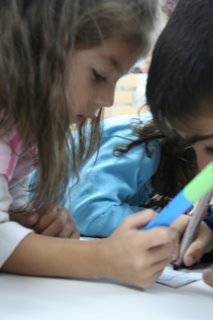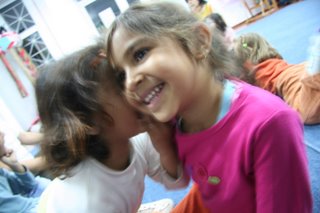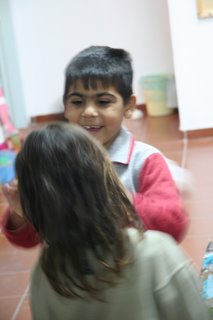


The season finally seems to have changed, and so too has the flavor of my life. For the past two weeks, I have been frightfully sick, as has all of the staff at Schedia. While we dragged our bodies around on autopilot, the world, somewhat surprisingly, has kept moving, and it has been curious to see all that has transpired. I woke up this morning with the surprising realization that I have been in Greece for two months, and have another eight to go. I am still at the beginning of my time here, and although many days I feel as if I am treading water, I know that slowly I am drifting in a specific direction.
I say that I am moving, but from what to what? What do I do here, and what does Schedia do? I have been so caught up in the swirl of my life that I have neglected to write anything about the program on this page. This is partially because I am still learning about Schedia. I arrived in the middle of an extremely tumultuous time in the lives of those involved with the program, and things have not cooled off since. Also, the theme of the program, namely diversity, naturally touches upon the historical tender spot of ethnicity. I have learned that I must be careful because even when speaking casually with my colleagues, many of my questions bring up sticky issues that are difficult to explain, and that everyone has a slightly different take on.
As a foreigner arriving without having studied the history of the region, and particularly as an American foreigner, I do not fully understand the ethnic divides in Greece -- I cannot pick an Albanian out of a crowd, nor do I really care to. Any newcomer to Athens can tell you that this is an incredibly diverse city. By some accounts more than one of every ten people living here was born outside the country. As I myself am one of the foreign born residents, it seems quite natural that the city is composed in this way, and the huge numbers of non-Greeks make me feel a bit less like a fish out of water. Also, I admit, the diversity of the population gives the city a wonderful flavor that I find exciting. However, there are deep divides within the Greek population regarding the influx of foreign-born residents, and the tension that is impossible to miss. Even among those who consider themselves sympathetic, there are reactions that surprise me. When I have told Greek friends about being accosted by men on the street, the usual response is, “Where were you? Oh, there are a lot of foreigners around there.” Conversely, many of the foreigners that I meet and speak with tell me to be wary of my Greek friends. “Yes, they will show you a good time,” they say, “but then they will turn their back on you. You can be friends with them, but never forget that you will never be one of them.”
Here there is a distinct stigma against foreigners (from poor countries). Until 15 years ago, Greece had not received any substantial number of immigrants. However, after the former soviet block opened, there was a sudden flood, and the country was not equipped to deal with the many social issues that arise with an influx of poor, and often uneducated, immigrants. When the Albanians first began to arrive, the word ‘Albanian’ was used interchangeably with ‘unskilled laborer’ and it is a widely believed myth that Albanians brought with them a wave of serious crime that was previously unknown in Greece. However, attitudes towards Albanians are slowly changing. As children are born and grow up here, people say, “Yes, when they arrived it was bad. But now you can see a change. They are making efforts, and they are becoming Greek.” Perhaps that is where the difference lies. They are seen to be making efforts at assimilation. For the Turks who have been here for generations and somehow kept their language and maintained a distinct culture, it is not the same. For Africans and Pakistanis who arrive without papers, money, or knowledge of the Greek language, it is another matter entirely.
My upbringing in the United States, and subsequent experience abroad has added to my discomfort with many of the conversations that I have had regarding ethnicity. Of course, I also do not understand what it would be like for a city such as Athens to receive these great numbers foreign-born residents in the past 15 years. One cannot imagine such an influx to be easily folded into the general population. Nor necessarily should it. But what then should happen? How do the new residents make a space for themselves, and what about their children? As a child in the public school system in the United States, I was confusingly taught both not to see ethnic differences, and also to celebrate them. However, in Greece, it is a different story. Or at least, it used to be. Either you are Greek or you are not. Speaking with most Greeks, at first take, it is very easy to draw lines between insider and outsider. It is only when asked twice, that most admit how fuzzy the line can be, and the reasons for the blurring are complex. Depending on whom you ask, the beginnings date back for two thousand years.
The area that is now Greece is at a particularly strategic regional placement, and borders have never been and in some places still are not clear. Adding to the confusion, modern Greece was under foreign rule from what is now Turkey for 400 years (many Greeks and Irish feel a particular affinity towards each other), and this messy relationship made the line between Turks and Greeks thin and sharp, although the separation was based on religion and language rather than a nationalistic identity. Until 1922, there was a sizable Turkish population in Greece, and Greek population in Turkey.
I had assumed that most of the children with whom I am working were born outside of Greece. However, although Turkish is their mother tongue, and they are Muslim, most of their families have been in Greece for at least two generations. In 1922, there was a crisis, and subsequently, Greece and Turkey signed a treaty that would forcibly remove Christian Orthodox (Greek) individuals from Turkey, and Muslim (Turkish) individuals from Greece. However, the city of Alexandroupolis, in Greece, was exempt from this treaty, and there is still a large Turkish-speaking minority living there. Over time, families from this city, which is located in the extreme north, migrated south to Elefsina and one neighborhood in Athens. Caught between two cultures with a history of animosity, the families are trapped without a positive cultural identity; although Greece is the only home that they know, they are not seen or treated as Greeks would each other, but neither are they really Turkish. When I speak with people about this issue, the conversation usually stops here. No one knows what should come next.
Schedia, the organization for which I am working, is based in Athens. It is about 15 years old. In the past they have run arts programming for both minority and majority children in central Athens. The organization's intention is to bring together children who are both in and out of mainstream society, using art as both a means for self-expression and a tool for building relationships. Starting about three years ago, they began to focus their efforts on the creation of a community center in Elefsina, an industrial town about 30 km west of Athens. Schedia is now full-partners with the municipality in the running of this center. They offer programming every evening, and on weekends, ranging from workshops for parents and children to video/theater workshops for teenagers. I am involved with two of the classes. The first is the twice-weekly arts and theater workshop for children ages 4-10. The second is that in which parents and children work together on arts projects.
As it stands now, my job is to photograph the programs in Schedia that I am involved in. This means that three days a week, I go to the center, and make photographs. On the other days of the week, I edit these photographs, write, and try to meet and speak with people about what I see going on around me. I arrived in Greece with no previous knowledge of these intricately layered issues, and it is taking time to figure out not only what is going on, but also my place within it. Contrary to what I would have thought, this job is becoming more difficult as I go on. I have more questions that cannot be answered, and constantly feel that I am hovering just on the outside edge of doing good work. Adding to this feeling of frustration is the fact that I am working within and trying to learn about a culture where I do not, and probably will not, speak the language. The good part is that everyone with whom I am working is forgiving of my linguistic deficiency, and most also speak beautiful English or French, although this has not helped my motivation to study. I am confident that slowly something is developing, and I am curious to see how it develops. As challenging as it has sometimes been, I am fully aware that I am one of the lucky immigrants here, arriving with money, with a task, and most importantly, with a return ticket to the place I call home.
